Sustainability Management
Shin-Etsu Group’s Sustainability
The Shin-Etsu Group has established a Basic Sustainability Policy based on its Business Principle and is working to address nine key sustainability issues. In May 2024, we revised our Basic Sustainability Policy following approval by the Managing Directors’ Meeting and the Board of Directors attended by all directors, audit & supervisory board members and corporate officers.
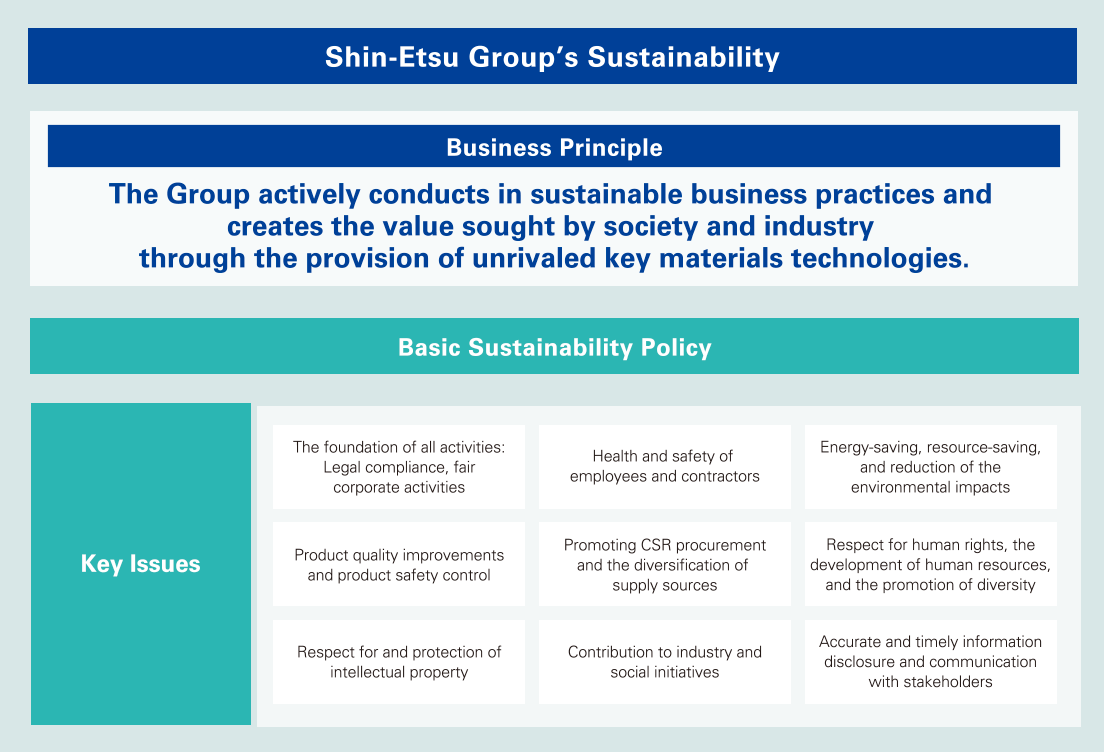
Shin-Etsu Group Business Principle
The Group actively conducts in sustainable business practices and creates the value sought by society and industry through the provision of unrivaled key materials technologies.
Basic Sustainability Policy
The Shin-Etsu Group will:
- Do our best to increase the Group's corporate value through sustainable growth and make multifaceted contributions to society.
- Carry out all our company activities while always placing the utmost priority on safety.
- Expand those businesses that contribute to the reduction of greenhouse gas emissions.
- Maximize the efficiency of product development and manufacturing, and contribute to higher efficiency of society by supplying our products thus produced.
- Engage in business activities while taking biodiversity into account and seeking harmony with the global environment.
- Strive to respect human rights, assure equality in employment opportunities, and support the self-fulfillment of our employees.
- Appropriately disclose information in a timely manner.
- Carry out healthy, trustworthy, transparent corporate activities in compliance with laws and regulations based on the integrity of the Group's ethical values.
Revised May 2024
Governance
Structure of Initiatives
The Group believes that it is the social responsibility of the Group to contribute to all of our stakeholders, such as shareholders, investors, customers, suppliers, local communities, and employees.
To achieve this, we formulated the "Basic Sustainability Policy" and internal regulations and carry out sustainability activities. In order to develop sustainability initiatives effectively and properly at a company-wide level in all aspects of corporate activities, we have set up the Sustainability Committee, which is chaired by the President and comprises approximately 60 members, including Directors, Corporate Officers and department heads of Shin-Etsu Chemical and sustainability officers from group companies.
Structure of Initiatives
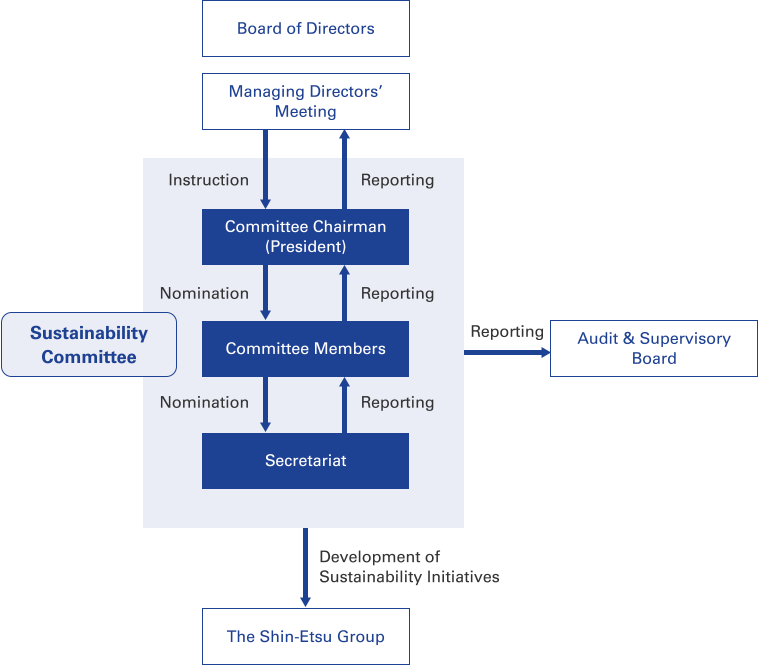
| Position | Name | Current Positions (related to Sustainability) |
Key Issues about Sustainability and Other Matters |
|---|---|---|---|
| Representative Director, Chairman of the Board Meeting | Fumio Akiya | In charge of Technologies | Key Issue: Product quality improvements and product safety control |
| Representative Director, President | Yasuhiko Saitoh | Chairman of Sustainability Committee | |
| Managing Corporate Officer | Toshiya Akimoto | Vice Chairman of Sustainability Committee In charge of Public Relations, Legal Affairs General Manager of Office for Digitization and Digitalization Chairman of Risk Management Committee |
The foundation of all activities: legal compliance, fair corporate activities Key Issue: Respect for and protection of intellectual property Key Issue: Accurate and timely information disclosure and communication with stakeholders Risk Management |
| Managing Corporate Officer | Fumio Arai | In charge of Purchasing | Key Issue: Promoting CSR procurement and the diversification of supply sources |
| Managing Corporate Officer | Masaki Miyajima | In charge of Business Auditing | Corporate Governance |
| Corporate Officer | Toshiyuki Kasahara | General Manager of Finance & Accounting Dept. In charge of Office of the President |
Corporate Governance (Fair tax payment, Operation of Group Companies) |
| Corporate Officer | Yoshimitsu Takahashi | In charge of General Affairs, Environmental Control & Safety Relations | Corporate Governance Key Issue: Health and safety of employees and contractors Key Issue: Energy-Saving, Resource-Saving, and Reduction of the Environmental Impact |
| Corporate Officer | Kai Yasuoka | Personnel & Labor Relations | Key Issue: Respect for human rights, the development of human resources, and the promotion of diversity |
| Corporate Officer | Shigeyoshi Netsu | In charge of Patents | Key Issue: Respect for and protection of intellectual property |
As of June 27, 2024
Participating in the UN Global Compact
In November 2010, the Group joined the UN Global Compact.
Life in society has become more complex and diverse in recent years, and the social responsibilities of enterprises have grown. The Group remains firmly committed to its business principle of complying with all laws and regulations, conducting fair business practices and creates unrivaled value for society and industry through the provision of key materials and technologies. At the same time we respond flexibly to changes in the social and economic environment.
The Group has also been participating in the Global Compact Network Japan (GCNJ) since November 2010. The Group joins subcommittees, such as the Environmental Management Subcommittee and ESG Subcommittee, to use the information gained on the latest development of sustainability to promote the Group's Sustainability.
The Group, as the f irst in Japan, signed a document to support GCNJ's Tokyo Principles for Strengthening Anti-Corruption Practices in February 2018.
Global Compact Ten Principles
Human Rights
- Principle 1:
- Businesses should support and respect the protection of internationally proclaimed human rights; and
- Principle 2:
- make sure that they are not complicit in human rights abuses.
Labour
- Principle 3:
- Businesses should uphold the freedom of association and the effective recognition of the right to collective bargaining;
- Principle 4:
- the elimination of all forms of forced and compulsory labour;
- Principle 5:
- the effective abolition of child labour; and
- Principle 6:
- the elimination of discrimination in respect of employment and occupation.
Environment
- Principle 7:
- Businesses should support a precautionary approach to environmental challenges;
- Principle 8:
- undertake initiatives to promote greater environmental responsibility; and
- Principle 9:
- encourage the development and diffusion of environmentally friendly technologies.
Anti-Corruption
- Principle 10:
- Businesses should work against corruption in all its forms, including extortion and bribery.
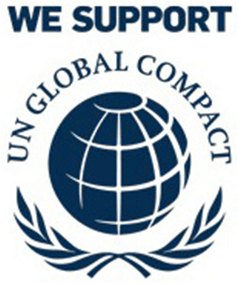
Related information
Evaluation from Outside the Company
The Company is incorporated in the following Sustainability index.
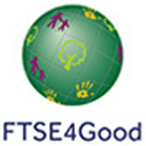
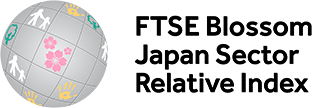




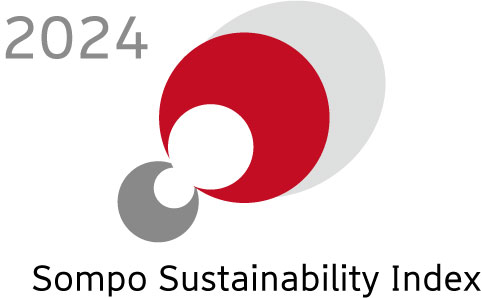
*FTSE Russell (the trading name of FTSE International Limited and Frank Russell Company) confirms that Shin-Etsu Chemical Co., Ltd. has been independently assessed according to the FTSE4Good criteria, and has satisfied the requirements to become a constituent of the FTSE4Good Index Series. Created by the global index provider FTSE Russell, the FTSE4Good Index Series is designed to measure the performance of companies demonstrating strong Environmental, Social and Governance (ESG) practices. The FTSE4Good indices are used by a wide variety of market participants to create and assess responsible investment funds and other products.
https://www.lseg.com/en/ftse-russell/indices/ftse4good
*FTSE Russell: FTSE Russell hereby certifies that Shin-Etsu Chemical Co., Ltd. has met the requirements for inclusion in the FTSE Blossom Japan Sector Relative Index as a result of a third-party survey and has become a constituent of this index. The FTSE Blossom Japan Sector Relative Index is widely used to create and evaluate sustainable investment funds and other financial products.
https://www.ftserussell.com/products/indices/blossom-japan/
*FTSE Russell confirms that Shin-Etsu Chemical Co., Ltd. has been independently assessed according to the index criteria, and has satisfied the requirements to become a constituent of the FTSE Blossom Japan Index. Created by the global index and data provider FTSE Russell, the FTSE Blossom Japan Index is designed to measure the performance of companies demonstrating strong Environmental, Social and Governance (ESG) practices. The FTSE Blossom Japan Index is used by a wide variety of market participants to create and assess responsible investment funds and other products.
*MSCI:The inclusion of Shin-Etsu Chemical Co., Ltd. in any MSCI index, and the use of MSCI logos, trademarks, service marks or index names herein, do not constitute a sponsorship, endorsement or promotion of Shin-Etsu Chemical Co., Ltd. by MSCI or any of its affiliates. The MSCI indexes are the exclusive property of MSCI. MSCI and the MSCI index names and logos are trademarks or service marks of MSCI or its affiliates.
As of June 30, 2024
Utilization of Supply Chain CSR Management Systems
The Group utilizes supply chain CSR management systems, such as RBA Online*1, Sedex*2, EcoVadis*3, and CDP*4 to disclose CSR information. In FY2023, the CDP evaluation was A-.
*1RBA Online
An online database organized by NPO Responsible Business Alliance (former: Electronic Industry Citizenship Coalition) to manage labor, health and safety, environment, and ethics in the supply chain. Enterprises in the global electronic industry and others join the Responsible Business Alliance.
*2Sedex
An online database organized by and named after NPO Sedex for storing and accessing data on ethical and responsible business practices. Enterprises from 150 countries in 28 industries, including food, automobile, cosmetics, and amenity, have joined Sedex.
*3EcoVadis
The supply chain management system operated by the French CSR rating agency, EcoVadis, is used by multinational corporations in 150 countries in North America, Asia, and Europe.
*4CDP
An international environmental non-profit organization established in the UK in 2000 that operates a global environmental information disclosure system for companies and local governments. The annual environmental information disclosure and evaluation process is widely recognized as an international standard for corporate environmental information disclosure.
Strategy
While key issues facing the global environment and society pose risks that threaten the sustainable growth of the Shin-Etsu Group, our initiatives to address them will create new business opportunities. The Group therefore strives to identify the risks and opportunities associated with these key issues and seeks to mitigate the risks. Meanwhile, by providing products that contribute to solving social issues, including global environmental issues, we aim to simultaneously create a sustainable society and achieve sustainable growth for the Group.
Risks and Opportunities Related to the Key Issues
The Shin-Etsu Group recognizes the risks, and opportunities associated with all key Sustainability issues and addresses them accordingly.
| Key Sustainability Issues | Major Risks and Opportunities | Corresponding initiatives | |
|---|---|---|---|
| The foundation of all activities: legal compliance, fair corporate activities | Risks |
|
KPI (FY2023 results) |
| Opportunities |
|
||
| Health and safety of employees and contractors | Risks |
|
KPI (FY2023 results) |
| Opportunities |
|
||
| Energy-saving, resource-saving, and reduction of the environmental impacts | Risks |
|
KPI (FY2023 results) |
| Opportunities |
|
||
| Product quality improvements and product safety control | Risks |
|
|
| Opportunities |
|
||
| Promoting CSR procurement and the diversification of supply sources | Risks |
|
|
| Opportunities |
|
||
| Respect for human rights, the development of human resources, and the promotion of diversity | Risks |
|
KPI (FY2023 results) Ratio of women at the time of hiring: Administrative positions 33.3%, Engineering positions 9.9% (Employees and seconded employees of Shin-Etsu Chemical) |
| Opportunities |
|
||
| Respect for and protection of intellectual property | Risks |
|
|
| Opportunities |
|
||
| Contribution to industry and social initiatives | Risks |
|
|
| Opportunities |
|
||
| Accurate and timely information disclosure and communication with stakeholders | Risks |
|
|
| Opportunities |
|
||
Related information
Risk Management
Risk Management Committee
We have established a Risk Management Committee consisting of approximately 20 members, including directors, corporate officers, and department managers, to establish a risk management system, develop rules and regulations, and identify and prevent risks that may arise in the course of business activities. In addition, we promote cross-func-tional activities among divisions and Group companies, including the formulation of business continuity plans, training, and information sharing. Furthermore, important matters in risk management are reported to the Board of Directors, the Managing Directors’ Meeting, and the Audit & Supervisory Board. In FY2023, the Risk Management Committee met four times and monthly meetings were held by the secretariat. At the meetings, production risks in the event of infrastructure outages, as well as risks related to information leakage, are discussed and shared within the Committee in order to enhance risk preparedness. In addition, opinions are exchanged within the Committee to formulate priority risk management issues to be addressed in FY2024 onward.
Risk Management Regulations
The Company has established Risk Management Regulations that anticipate comprehensive risks that may arise in the course of the Shin-Etsu Group’s business activities from a long-term perspective and has established a risk management system and responses to any risks that materialize.
Risks anticipated in the Risk Management Regulations
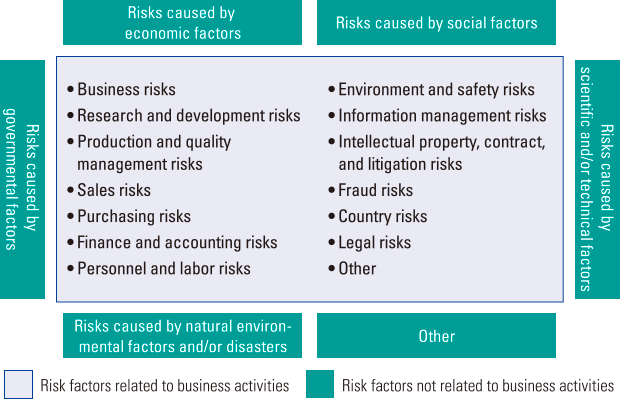
Risk Management Procedures
Risk management is carried out following the procedures of the PDCA cycle shown in the diagram below in accordance with the characteristics of each risk.

Activities of the Risk Management Committee in FY2024
The Risk Management Committee works in a multifaceted and company-wide effort to preemptively eliminate risks that may affect management and business activities, and to minimize the impact of risks when they do occur and prevent their recurrence.
In FY2023, in addition to its ongoing work of considering countermeasures against geopolitical risks, cybersecurity risks, infrastructure risks, and other risks, including those of Group companies in Japan and overseas, the Committee worked on securing human resources, taking measures to prevent talent outflow, and ensuring stable procurement of raw materials.
In light of the volatile international situation in FY2024, the Committee will continue its efforts to prevent and strengthen measures against the following risks:
- Strengthening earthquake countermeasures at plants (BCP)
- Stable procurement of raw materials
- Recruitment and retention of employees
- Plant safety measures
- Strengthening countermeasures against information leaks, cyberattacks, etc.
- Enhanced compliance, etc.
In addition, we will check the status of efforts to address these risks in each of our core business divisions and Group companies and proceed with necessary countermeasures together with the relevant business unit. The Risk Management Committee will continue to support the sustainable development of the company by eliminating risks before they occur and enhancing risk preparedness.
Business Continuity Plan and Handling in Emergencies
The Group offers a number of products with high market share not only in Japan but around the world or which used in special applications in state-of-the-art industries. For that reason, if these products cannot be supplied due to an accident or serious disaster such as a massive earthquake or fire, it will have an effect on society.
In the Company, each division and each plant is preparing for a disaster and accident and formulates a business continuity plan on the basis of the Companywide Business Continuity Management Regulations.
In addition, if a disaster or accident occurs, we will work using the structure shown below. Each of the countermeasures head office and organizations carry out emergency response and recovery support on the basis of pre-defined business standards.
System and major response operation in the occurrence of a disaster or accident
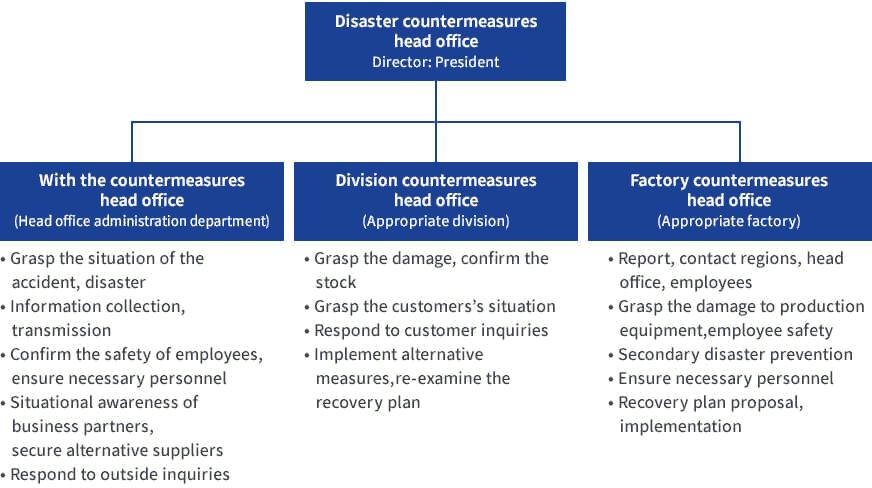
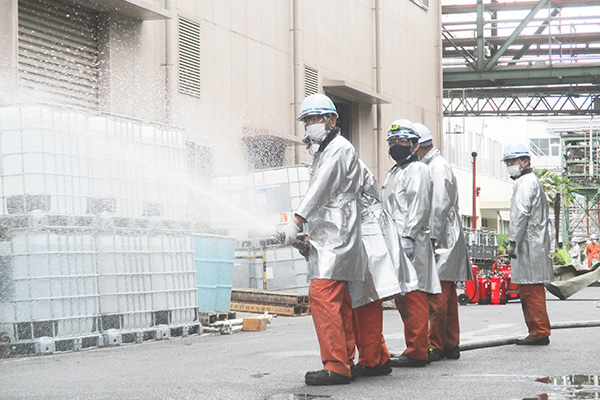
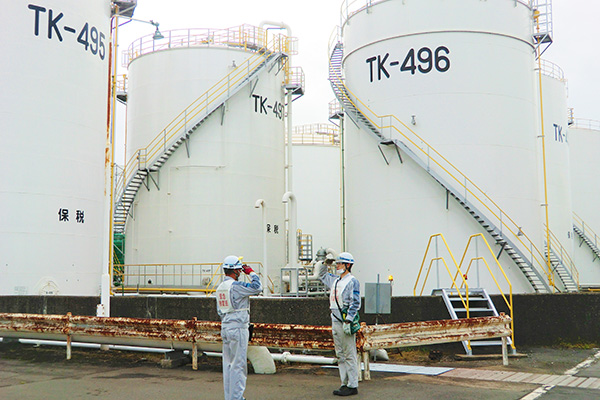
Conduct comprehensive disaster prevention drills
(June 2023, Shin-Etsu Chemical Gunma complex)
(November 2023, Shin-Etsu Chemical Kashima plant)
Metrics and Targets
In line with its Basic Sustainability Policy, the Shin-Etsu Group identifies key issues and sets metrics and targets to manage our initiatives to address them. The results are as follows.
| KPI | Results (FY2023) |
Targets | Scope | |
|---|---|---|---|---|
| Legal compliance | Number of serious violations of laws and regulations | 0 | 0 | Consolidated |
| Environment | GHG Emissions (Scope1+Scope2) | 6,507 thousand CO2-t | 0 CO2-t (FY2050) |
Consolidated |
| Emissions intensity index of production volume relative to 1990* | 57.0%(Shin-Etsu Group)、53.4%(Shin-Etsu Chemical) | 45% (FY2025) |
Shin-Etsu Chemical and its domestic and overseas group companies | |
| Average rate of energy consumption in terms of production intensity | 0.3% increased | Reduce energy consumption in terms of production intensity at an average annual rate of 1% | Consolidated | |
| Average rate of water withdrawal in terms of production intensity | decreased by 17.7% | Reduce average rate by 1% in terms of production intensity | Consolidated | |
| Average rate of BOD emissions in terms of production intensity | increased by 1.6% | Reduce average rate by 1% in terms of production intensity | Consolidated | |
| Final waste landfill disposal rate | 1.08% (domestic consolidated companies) | Achieve zero waste emissions (landfill waste of 1% or less of the final amount of all waste generated) |
Consolidated companies in Japan. | |
| Average rate of emissions of air pollutants in terms of production intensity | 11.1% increased in Soot, 7.1% reduction in SOx | Reduce emissions of air pollutants in terms of production intensity at an average rate of 1% | Consolidated | |
| Social | Number of work-related employee fatalities | 0 | 0 | Consolidated |
| Number of serious accident | 0 | 0 | Consolidated | |
| Lost-time accidents rate | 0.15 (Japan), 0.75 (Overseas) | 0 | Japan: Shin-Etsu Chemical and its domestic consolidated companies. Overseas: Shin-Etsu Chemical's overseas consolidated companies. |
|
| Lost-time accidents severity rate | 0.01 (Japan), 0.03 (Overseas) | 0 | ||
| Number of child labour | 0 | 0 | Consolidated | |
| Number of forced labour | 0 | 0 | Consolidated | |
| Ratio of women at the time of hiring | Administrative positions: 33.3%, engineering positions: 9.9% | Administrative positions: 40%, engineering positions: 10% | Employees and seconded employees of Shin-Etsu Chemical | |
| Number of women in managerial positions, including junior manager level | 3.47 times | 4x versus FY2014 | Employees and seconded employees of Shin-Etsu Chemical |
*For the calculation of emissions, CO2 emission factors for electricity are averaged from 2000 to 2009 so that efforts to reduce electricity can be clarified. Furthermore, to clarify our efforts in energy reduction and rationalization, the figures do not include additional emissions categories associated with the amendments to Japan's Act on Promotion of Global Warming Countermeasures that took effect in 2024.
For other metrics, please see Sustainability Data.
Related information


